Unlocking the secrets of your car’s health is now easier than ever with an OBD2 scanner. These ingenious devices act as a bridge to your vehicle’s onboard computer, providing access to a wealth of diagnostic information. Whether you’re facing a mysterious dashboard light or suspect a hidden issue, an OBD2 scanner empowers you to understand what’s happening under the hood without the need for immediate professional intervention.
However, navigating the world of OBD2 scanners can be overwhelming, especially for beginners. With countless models available, it’s crucial to choose one that meets your specific needs and technical expertise. Having rigorously tested a wide array of OBD2 scanners over the years, we’ve compiled a list of the top contenders available today. This guide will walk you through the best options, highlighting their strengths and ideal use cases. Keep reading to discover our top picks and gain a deeper understanding of how OBD2 scanners function and decipher those cryptic error codes.
Our curated list features a variety of scanners, from the incredibly user-friendly and wireless Topdon TopScan, perfect for mobile diagnostics, to the budget-friendly Launch CR529, offering exceptional value. For those seeking a professional-grade experience, the Topdon Phoenix Lite 2 delivers advanced features, albeit at a premium price.
Below are our top ten OBD2 scanner selections for purchase right now, catering to diverse needs and budgets.
Top OBD2 Scanners: Quick List
For a quick overview, here are the top OBD2 scanners from our testing. Continue scrolling for detailed reviews of each product and insights into what makes them stand out.
| # | Product | Best For | Link |
|---|---|---|---|
| 1 | Topdon TopScan | Mobile Scanning | Read More |
| 2 | Launch CR529 | Budget-Friendly Users | Read More |
| 3 | Topdon Phoenix Lite 2 | Professional-Level Diagnostics | Read More |
| 4 | Ancel BD310 | Dual-Purpose Use | Read More |
| 5 | Carly OBD-II Scanner | Companion App Experience | Read More |
| 6 | Innova CarScan Mobile 1000 | Innovative Bluetooth Features | Read More |
| 7 | ThinkCar ThinkDiag TKD01 | Robust Build & Extended Codes | Read More |
| 8 | Autel AutoLink AL539 | Electrical Diagnostics | Read More |
| 9 | FOXWELL NT301 | User-Friendly Interface for Beginners | Read More |
| 10 | BlueDriver Bluetooth Professional OBDII Scan Tool | Comprehensive Vehicle Data & Repair Reports | Read More |
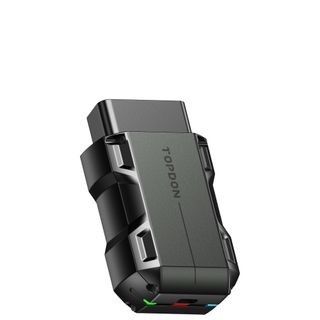
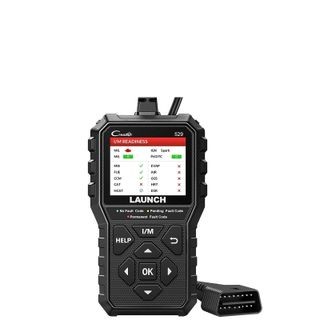
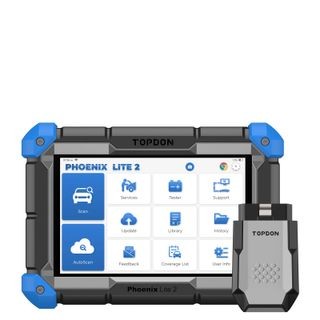
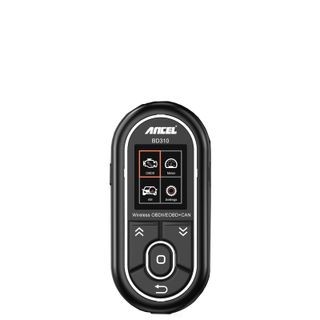
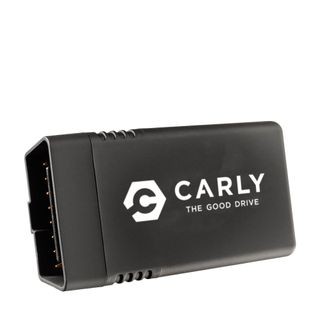
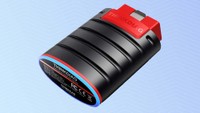


In-Depth Reviews: Top OBD2 Scanners
Dive deeper into the features and performance of each of our top OBD2 scanner recommendations.
1. Topdon TopScan: Best Mobile OBD2 Scanner
The Topdon TopScan redefines mobile car diagnostics. Don’t let its compact size fool you; this Bluetooth OBD2 scanner is packed with professional-grade features, all accessible from your smartphone. Its ease of setup is a major highlight, making it incredibly user-friendly, even for those new to OBD2 scanners.
Beyond basic fault code reading and I/M Readiness tests, the TopScan delves into performance and efficiency analysis. It can estimate horsepower and torque, offering insights typically found in much more expensive professional tools. This comprehensive capability makes the Topdon TopScan an invaluable tool for both proactive car maintenance and performance enthusiasts.
Pros:
- Extensive vehicle diagnostic coverage
- Real-time live data display
- Unique performance indicators and estimations
- Comprehensive maintenance item coverage
Cons:
- Larger transmitter may feel bulky to some
- Advanced features may require a subscription after the first year
The Topdon TopScan offers a blend of portability, user-friendliness, and advanced features that are hard to beat, especially for its price point. It’s an excellent choice for anyone seeking a powerful, mobile OBD2 diagnostic solution.
Read our full Topdon TopScan review
2. Launch CR529: Best Cheap OBD2 Scanner
For car owners on a budget, the Launch CR529 provides incredible value without sacrificing essential OBD2 functionality. Priced under $50, this handheld scanner delivers features often found in more expensive models. Its compact and robust design makes it a practical tool for everyday diagnostics.
The Launch CR529 excels in providing core OBD2 functions, including reading and clearing fault codes, displaying live data streams, and performing I/M readiness checks. The inclusion of lifetime free updates is a significant advantage, ensuring long-term usability and value. While it may lack some advanced features and manufacturer-specific codes, the CR529 covers the essential diagnostic needs for most car owners.
Pros:
- Extremely affordable
- Lifetime free software updates
- User-friendly pre-inspection report feature
Cons:
- Lacks manufacturer-specific diagnostic codes
- May feel slightly heavy for its size
- Shorter 1-year warranty
The Launch CR529 proves that affordability doesn’t have to mean compromising on quality or essential features. It’s a top recommendation for first-time OBD2 scanner users and those seeking a reliable, budget-friendly diagnostic tool.
Read our full Launch CR529 review
3. Topdon Phoenix Lite 2: Best Professional-Level OBD2 Scanner
The Topdon Phoenix Lite 2 bridges the gap between amateur and professional automotive diagnostics. This robust, tablet-style OBD2 scanner offers an extensive suite of advanced features, making it suitable for both serious DIYers and professional mechanics. Its wireless operation and rugged design enhance usability in any garage environment.
Featuring an 8-inch touchscreen, Wi-Fi connectivity, and Bluetooth, the Phoenix Lite 2 provides a versatile and powerful diagnostic experience. It supports a wide range of diagnostic tests, live data graphing, and special functions typically found in high-end professional scan tools. While it comes with a higher price tag, the Phoenix Lite 2 delivers exceptional capabilities and comprehensive vehicle coverage.
Pros:
- Near-professional OBD2 diagnostic capabilities
- Wireless operation with Bluetooth and Wi-Fi
- Large, user-friendly 8-inch touchscreen
- Extensive array of diagnostic tests and live data options
- Includes adapters and a protective hard case
Cons:
- Larger size and heavier build may be cumbersome for some
- Higher price point compared to basic scanners
- Subscription required for updates after the initial two years
The Topdon Phoenix Lite 2 is a premium OBD2 scanner that offers a significant step up in diagnostic power and features. It’s a worthwhile investment for those who demand comprehensive diagnostic capabilities and professional-level performance.
Read our full Topdon Phoenix Lite 2 review
4. Ancel BD310: Best Dual-Purpose OBD2 Scanner
The Ancel BD310 stands out with its dual functionality, serving as both a standard handheld OBD2 scanner and a supplementary vehicle display. Its compact and lightweight design makes it incredibly portable and convenient for everyday use.
Beyond basic OBD2 diagnostics, the BD310 can connect to your smartphone via Bluetooth and display real-time engine parameters directly in your car’s cabin. This unique feature allows you to monitor vital engine data while driving, adding a layer of insight beyond typical fault code reading. While the screen is smaller, the BD310’s versatility and portability make it a practical choice for many car owners.
Pros:
- Lightweight and compact for easy storage
- Functions as both an OBD2 scanner and a secondary car display
- Offers both handheld and Bluetooth scanning options
Cons:
- Minimalist interface may lack visual appeal for some
- Smaller 2-inch screen
The Ancel BD310 offers a unique combination of diagnostic functionality and real-time vehicle monitoring in a compact package. Its dual-purpose nature and ease of use make it a compelling option for drivers seeking added vehicle insights.
Read our full Ancel BD310 review
5. Carly OBD-II Scanner: Best OBD2 Scanner with a Companion App
The Carly OBD-II Scanner prioritizes user experience with its exceptionally well-designed companion app. This Bluetooth scanner, paired with the Carly app, offers a seamless and feature-rich diagnostic experience, especially for owners of VW, BMW, and Ford vehicles.
The Carly app goes beyond basic OBD2 functions, offering advanced customization options, professional-level tests, and even coding capabilities for supported car models. It also provides repair guidance and used car check features. However, the full potential of the Carly scanner is car-dependent, and a subscription is required to unlock advanced features beyond basic OBD2 diagnostics.
Pros:
- Incredibly user-friendly and intuitive companion app
- Extensive customization options within the app
- Real-time live data display and logging
- Includes maintenance and repair information
- Lifetime warranty and software updates
Cons:
- Feature availability varies significantly depending on car make and model
- Subscription model can become expensive for full app functionality
The Carly OBD-II Scanner, with its powerful companion app, provides a premium and user-focused OBD2 experience. It’s particularly appealing to owners of compatible European and Ford vehicles who seek advanced diagnostic and customization options.
Read our full Carly OBD scanner review
6. Innova CarScan Mobile 1000: Innovative Bluetooth OBD2 Scanner
[
The Innova CarScan Mobile 1000 brings innovation to the Bluetooth OBD2 scanner market. Building upon Innova’s reputation for reliable diagnostic tools, this wireless scanner offers advanced features like predictive diagnostics in a convenient smartphone-based format.
The CarScan Mobile 1000 distinguishes itself with its predictive diagnostic capabilities, aiming to anticipate potential vehicle issues before they become major problems. Combined with Innova’s user-friendly app and simple setup, it provides a powerful and forward-thinking approach to car diagnostics. It’s an excellent choice for users who appreciate cutting-edge technology and proactive vehicle maintenance.
Pros:
- Innovative predictive diagnostic features
- User-friendly Innova app interface
- Simple and quick setup process
- Wireless Bluetooth connectivity
Cons:
- Some advanced features may require in-app purchases
- Relatively newer model, long-term reliability still being established
The Innova CarScan Mobile 1000 represents a step forward in OBD2 technology, offering predictive diagnostics and a seamless mobile experience. It’s a compelling option for tech-savvy car owners seeking advanced features and proactive vehicle management.
Read the full Innova CarScan Mobile 1000 review
7. ThinkCar ThinkDiag TKD01: Robust OBD2 Scanner with Extended Fault Codes
[
The ThinkCar ThinkDiag TKD01 prioritizes durability and extended diagnostic capabilities. While larger than some Bluetooth OBD2 scanners, its robust build ensures resilience, and it offers a wealth of manufacturer-specific error codes for in-depth diagnostics.
The ThinkDiag TKD01 stands out for its ability to not only read but also clear minor fault codes, potentially resolving issues without mechanical intervention. Its comprehensive manufacturer-specific code coverage and durable construction make it a valuable tool for serious DIY mechanics and automotive enthusiasts. Keep in mind that a subscription is required after the first year to maintain access to full features and updates.
Pros:
- Rugged and durable construction
- Extensive manufacturer-specific error code coverage
- Ability to clear minor fault codes
- Comprehensive diagnostic functions
Cons:
- Larger size compared to other Bluetooth scanners
- Subscription required after the first year for full functionality
The ThinkCar ThinkDiag TKD01 is a robust and feature-rich OBD2 scanner designed for users who demand durability and in-depth diagnostic capabilities. Its extended fault code coverage and ability to clear minor errors make it a powerful tool for advanced car maintenance.
Read our full ThinkCar ThinkDiag TKD01 review
8. Autel AutoLink AL539: Best OBD2 Scanner for Electrical Diagnostics
[
The Autel AutoLink AL539 is specifically designed to excel in diagnosing electrical issues in vehicles. This handheld OBD2 scanner integrates a built-in multimeter, making it uniquely suited for troubleshooting electrical faults like burnt cables, shorts, and blown fuses.
Beyond standard OBD2 functions, the AutoLink AL539’s multimeter functionality allows for direct electrical circuit testing, pinpointing electrical problems efficiently. It also offers a wide range of live data parameters and I/M readiness checks. For car owners and technicians who frequently encounter electrical issues, the AutoLink AL539 is an invaluable diagnostic tool.
Pros:
- Integrated multimeter for electrical diagnostics
- Wide range of live data parameters
- I/M Readiness test function
- Robust and reliable performance
Cons:
- Focus on electrical diagnostics may limit appeal for users primarily seeking standard OBD2 functions
- User interface may be less intuitive compared to app-based scanners
The Autel AutoLink AL539 is a specialized OBD2 scanner that uniquely addresses electrical diagnostic needs. Its integrated multimeter and robust OBD2 functionality make it an essential tool for anyone working with vehicle electrical systems.
Read our full Autel AutoLink AL539 review
9. FOXWELL NT301: User-Friendly OBD2 Scanner for Beginners
The FOXWELL NT301 is designed with beginners in mind, offering an incredibly user-friendly interface and straightforward operation. This handheld OBD2 scanner makes car diagnostics accessible to everyone, regardless of their technical expertise.
The NT301 prioritizes ease of use, featuring a clear and intuitive menu system, large buttons, and a bright color display. It covers essential OBD2 functions like reading and clearing codes, live data, and I/M readiness checks, all presented in a simple and understandable format. For those new to OBD2 scanners or who prefer a no-frills, easy-to-use tool, the FOXWELL NT301 is an excellent choice.
Pros:
- Extremely user-friendly interface, ideal for beginners
- Simple and intuitive menu navigation
- Large, easy-to-read buttons and display
- Affordable price point
Cons:
- Lacks advanced features found in higher-end scanners
- Display may be smaller compared to some handheld models
The FOXWELL NT301 excels in providing a user-friendly OBD2 diagnostic experience for beginners and those who value simplicity. Its ease of use and affordable price make it a great entry-level scanner for any car owner.
Learn more about the FOXWELL NT301 OBD2 Scanner
10. BlueDriver Bluetooth Professional OBDII Scan Tool: Comprehensive Vehicle Data & Repair Reports
The BlueDriver Bluetooth Professional OBDII Scan Tool distinguishes itself by providing comprehensive vehicle-specific repair reports and data. This Bluetooth scanner, paired with the BlueDriver app, aims to go beyond basic code reading, offering actionable repair information.
BlueDriver’s strength lies in its extensive database of vehicle repair information. When a fault code is detected, the BlueDriver app can provide detailed repair reports, including likely causes, common fixes, and even component locations. This feature can be incredibly helpful for DIYers and car owners seeking more than just a code definition. While it comes at a higher price than basic Bluetooth scanners, the added repair information can save time and money in the long run.
Pros:
- Comprehensive vehicle-specific repair reports
- Extensive vehicle coverage for domestic, Asian, and European makes
- User-friendly BlueDriver app
- Real-time data and graphing
Cons:
- Higher price point compared to basic Bluetooth scanners
- Repair report accuracy can vary depending on vehicle and fault code
The BlueDriver Bluetooth Professional OBDII Scan Tool offers a unique value proposition with its focus on providing actionable repair information. It’s a strong choice for DIYers and car owners who want a scanner that goes beyond basic code reading and assists with the repair process.
Learn more about the BlueDriver Bluetooth Professional OBDII Scan Tool
Frequently Asked Questions About OBD2 Scanners
What is an OBD2 Scanner?
An OBD2 scanner is a diagnostic tool that connects to your car’s onboard computer system, typically through the OBD2 port. It allows you to access and interpret data related to your vehicle’s engine, emissions, and other systems. Mechanics use these scanners to diagnose problems, and now car owners can use them for self-diagnosis and maintenance. Basic OBD2 scanners read and identify error codes, while more advanced models offer real-time system monitoring and predictive diagnostics.
What is the OBD2 Port?
The On-Board Diagnostics Version Two (OBD2) port is a standardized connector found in virtually all passenger vehicles sold in the United States since 1996, and in other regions shortly after. This port serves as the interface point to your car’s computer system. It’s used not only by OBD2 scanners but also by insurance telematics devices, dashcams, and other automotive electronics.
If you’re unsure of your OBD2 port location, you can find guides for North American vehicles and worldwide OBD2/EOBD port locations.
What is a DTC (Diagnostic Trouble Code)?
DTC stands for Diagnostic Trouble Code. It’s a standardized error code generated by your car’s OBD system when it detects a malfunction or issue. These DTCs are read by OBD2 scanners and provide valuable clues about the nature and location of the problem within your vehicle. While many DTCs are standardized across manufacturers, some are manufacturer-specific, providing more detailed information.
Understanding DTC Meanings
DTCs may seem cryptic at first glance, but they follow a logical structure. The first character indicates the affected vehicle system: Powertrain (P), Body (B), Chassis (C), or Network (N). The second character is a number: 0 for generic codes and 1 for manufacturer-specific codes.
The third character specifies the subsystem involved:
- 1: Fuel and air metering
- 2: Injector circuit fuel and air metering
- 3: Ignition system or misfire
- 4: Auxiliary emissions control
- 5: Vehicle speed control and idle control
- 6: Computer auxiliary outputs
- 7, 8, 9: Transmission and gearbox
- A, B, C: Hybrid propulsion systems
The fourth and fifth characters pinpoint the specific fault within the subsystem, ranging from 0 to 99. OBD2 scanners typically provide descriptions of these codes, and online resources like Google can further clarify their meaning. While there are thousands of possible DTCs, not all indicate critical issues. Some may simply signal minor problems or out-of-range sensor readings.
Choosing the Right OBD2 Scanner for Your Needs
Selecting the best OBD2 scanner depends on your individual needs, technical skills, and budget. These devices empower you to understand your car’s health, just like professional mechanics. OBD2 scanners come in two main types:
- Handheld OBD2 Scanners: These are standalone devices with their own display and cable for connecting to your car.
- Wireless OBD2 Scanners: These plug into your OBD2 port and communicate wirelessly via Bluetooth or Wi-Fi with your smartphone or tablet.
Regardless of the type, several key criteria should guide your choice:
- Ease of Setup: A scanner should be easy to set up and connect to your vehicle without complex procedures.
- Fault Code Explanation: The best scanners not only display fault codes but also provide clear explanations of their meaning, aiding in diagnosis and repair.
- I/M Readiness Check: Ensure the scanner can perform emissions system tests to verify your car will pass inspection.
- Accuracy: Accurate readings are paramount for reliable diagnostics. Inaccurate data renders a scanner useless.
- Size and Ergonomics: A compact and ergonomic design ensures the scanner is easy to handle and store in your vehicle.
- Live Data Display: Real-time data monitoring of engine parameters helps in diagnosing intermittent issues and performance problems.
- Data Graphing: Visual representations of data, like graphs, can be more insightful than raw numbers, especially for comparative analysis.
- Warranty and Updates: Look for scanners with robust warranties and software update options to ensure long-term usability and compatibility with newer vehicles.
Consider whether you prefer the standalone nature of a handheld scanner or the connectivity and app-based interface of a wireless model. Lifetime warranties and software updates add long-term value. For handheld scanners, prioritize screen size and clarity. Rugged designs are beneficial for durability. Some scanners offer extras like multimeters or manufacturer-specific code reading capabilities. With prices ranging from budget-friendly to professional-grade, finding an OBD2 scanner that fits your needs and budget is readily achievable.
Our OBD2 Scanner Testing Methodology
To rigorously evaluate the OBD2 scanners in our top ten list, we conducted hands-on testing using a 2014 Audi A4 Allroad over several weeks, both in a garage setting and during on-road driving. Each scanner was connected to the vehicle’s OBD2 port, and we verified its ability to correctly identify the Vehicle Identification Number (VIN).
For wireless scanners, we tested connectivity with various devices, including an Apple iPad Pro, Microsoft Surface, and Samsung Galaxy S9+. Handheld scanners were evaluated for their ease of use and display clarity after simply plugging into the OBD2 port. Cord lengths were measured on handheld units, and wireless ranges were assessed for Bluetooth scanners.
During vehicle operation, we monitored engine parameters and vital systems using each scanner. To simulate a fault condition, we intentionally disconnected the engine oil temperature sensor. We then assessed each scanner’s ability to detect and report the fault code, provide a description, and allow for clearing the code after reconnecting the sensor.
Finally, we road-tested each scanner, monitoring live data such as engine speed, timing, and coolant temperature. We evaluated data presentation in numerical, graphical, and gauge formats. Our testing focused on real-world usability, accuracy, and the overall diagnostic experience provided by each OBD2 scanner.
Understanding OBD2 fault codes is essential for effective car diagnostics. All DTCs consist of a letter prefix and four numbers. The prefix indicates the system: Powertrain (P), Body (B), Chassis (C), or Undefined (U). Of the approximately 5,000 possible DTCs, generic codes (starting with ‘0’ after the prefix) are common across all makes, while manufacturer-specific codes (starting with ‘1’) provide more detailed, brand-specific fault information. For example, a generic P0098 code points to an intake air temperature sensor issue, while a Ford-specific P1112 code indicates intermittent readings from the same sensor, suggesting replacement.
By understanding these nuances and utilizing a quality OBD2 scanner, car owners can gain valuable insights into their vehicle’s health and take proactive steps for maintenance and repair.